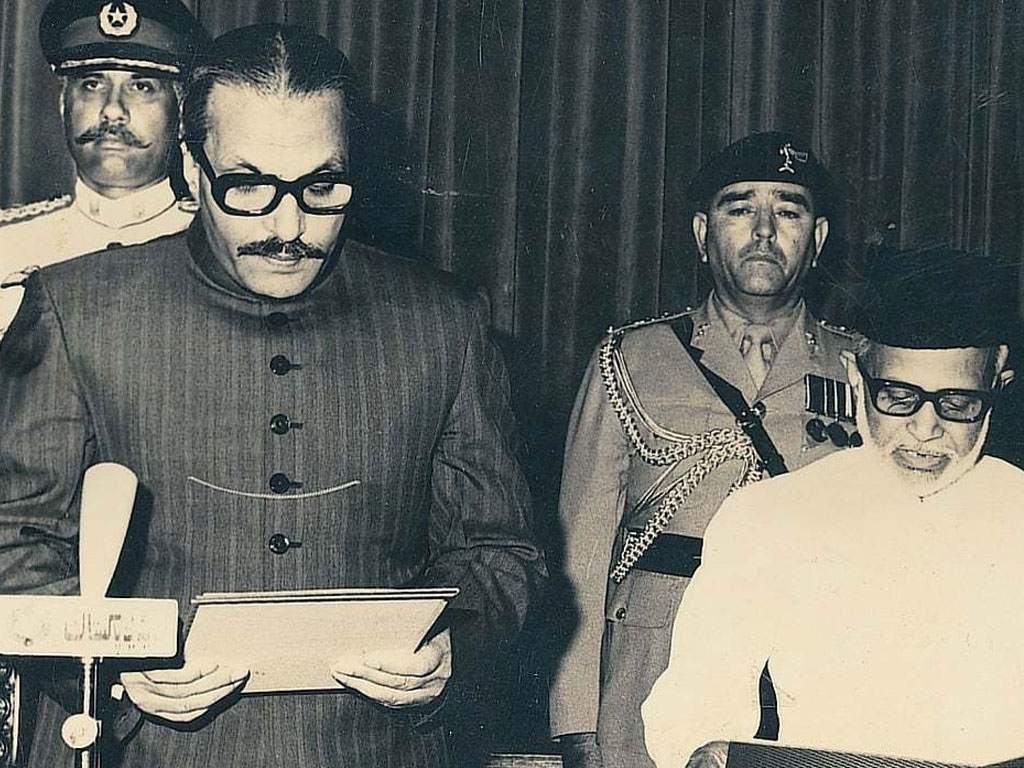Ironically, amendment not preceded by wider debate

One after the other dismissal of elected governments in 1990s by the presidents was a lingering pain in the neck of the democratic forces. There was that Article 58(2)b, inserted by the military dictator General Ziaul Haq into the Constitution, that empowered the President of Islamic Republic of Pakistan to send packing an elected government anytime he liked by dissolving the parliament. And it was employed by Ziaul Haq, Ghulam Ishaq Khan and Farooq Leghari. After the then President General Pervez Musharraf made exit from the national scene, the political parties from across the board came together with a common mission to vote against the prevalent system by amending the Constitution. The task was assigned to a committee of the newly-elected parliament, which came up with a draft for the 18th Constitutional Amendment. The legislation proposed by the committee had the potential to amend almost a one-third of the Constitution - its important recommendations being a parliamentary form of government, provincial autonomy, abolition of Concurrent List and no legal reprieve in cases of high treason. The committee took almost nine months to hammer out the proposed amendment, but as to what it proposed that was not in public knowledge. And this blackout almost persisted even when the draft of the 18th Constitutional Amendment was introduced in the parliament for legislation. As to why the parliament was in haste and passed it almost without debate on the floor of the country's top elected legislature there is no explanation. Even the then president, Asif Ali Zardari, who was to be relieved of his power to dismiss the government and dissolve the parliament, eagerly awaited the amendment bill to give his assent. If a comprehensive debate on a proposed law in the parliament is never the elected members' priority then what are they for - a question that has acquired urgency once again as the present parliament has yet to pass a bill.
Everywhere, periodic amendments to constitutions become necessary in order to remain in harmony with the march of time and emerging aspirations of people. But that's never a win-win situation, given the every-day changing challenges. So, issues and questions do emerge to which sometimes there are no answers in black and white in the book - the Constitution.
The courts do not make laws; they only interpret them, and for that, they seek guidance from a number of sources, including traditions, conventions and debates in the elected houses. How important are these sources, the business enacted in the British parliament is a case in point. Britain has no written constitution, and it is the traditions, conventions and debates that not only guide lawmaking processes but also help the courts in deciding the cases before them. Since that kind of comprehensive debate leading to enactment of the 18th Constitutional Amendment didn't take place it is problematic to decide the ownership of the under-dispute three federal government-run medical facilities in Karachi - JPMC, NICVD and NICH. Under the amended constitution, health is a provincial subject, but to it, there is the caveat: "for research, for professional or technical training or for the promotion of special studies" they remain with the federal government. As to why this exception there is no clue, because there was no debate on it in the parliament. "We were handicapped when we were discussing the vires of the 18th Amendment as we did not know as to whether the Parliament made any debate before passing it," says Chief Justice of Pakistan Mian Saqib Nisar. And given the present mode of business in the two houses of parliament, one would be naïve to believe that there would be debates on bills if and when they come in for enactment. Nobody seems to be taking the parliament seriously. Add to this absence of working relationship across the aisle and we have a dysfunctional parliament - what to talk of comprehensive debates in the country's two top elected houses. Our parliament is an expensive enterprise, to be its member is a herculean challenge and it is expected to upgrade our century-old legal system. It should meet far more often; it should conduct heated discussions - for, what is talked about on its floor not only helps courts interpret its legislated output but also helps create the much-needed informed public opinion. Be that as it may, the 18th Constitutional Amendment must not have been characterised by the absence of a wider debate.




















Comments
Comments are closed.